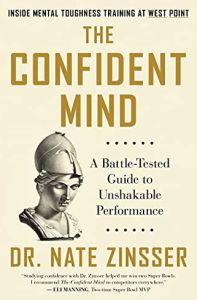Join getAbstract to access the summary!

Join getAbstract to access the summary!
Nate Zinsser
The Confident Mind
A Battle-Tested Guide to Unshakable Performance
Custom House, 2022
What's inside?
The key to success is confidence – and confidence is thinking the right thoughts at the right time.
Recommendation
Many people wish to be better at something, for example sports, work or school. Often, however, an invisible force – a lack of confidence – limits their improvement. Building on decades of experience mentoring athletes, students, executives and others, performance psychologist Nate Zinsser offers an easy-to-follow recipe for boosting success by building confidence. To do so, you need to understand confidence, think constructively about your past, present and future performance, and strategically maintain confidence in the face of internal and external obstacles. This will help you bring your A game to life.
Summary
About the Author
Nate Zinsser is director of the Performance Psychology Program of the US Military Academy at West Point. He also consults with people and organizations seeking a competitive edge.

















Comment on this summary